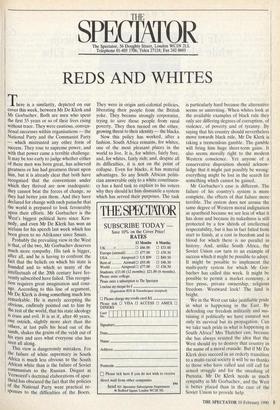SPECT TH 'AT OR
The Spectator, 56 Doughty Street, London WC1N 2LL Telephone 01-405 1706; Telex 27124; Fax 242 0603
REDS AND WHITES
There is a similarity, depicted on our cover this week, between Mr De Klerk and Mr Gorbachev. Both are men who spent the first 55 years or so of their lives rising without trace. They were cautious, conven- tional successes within organisations — the National Party and the Communist Party — which mistrusted any other form of success. They rose to supreme power, and with that power came a terrible challenge. It may be too early to judge whether either of these men was born great, has achieved greatness or has had greatness thrust upon him, but it is already clear that both have recognised that the conventions under which they thrived are now inadequate: they cannot beat the forces of change, so they had better join them. And they have declared for change with such panache that the world is prepared to look favourably upon their efforts. Mr Gorbachev is the West's biggest political hero since Ken- nedy, and even Mr De Klerk has won an acclaim for his speech last week which has been given to no Afrikaner since Smuts.
Probably the prevailing view in the West Is that, of the two, Mr Gorbachev deserves much more sympathy. His task is bigger, after all, and he is having to confront the fact that the beliefs on which his state is founded and to which so many of the intellectuals of the 20th century have fer- vently subscribed have failed. This recogni- tion requires great imagination and cour- age. According to this line of argument, Mr De Klerk is doing something much less remarkable. He is merely accepting the obvious, endlessly pointed out to him by the rest of the world, that his state ideology Is crass and evil. It is as if, after 40 years, One ostrich, slightly more alert than the others, at last pulls his head out of the sands, shakes the grains of the veldt out of his eyes and sees what everyone else has seen all along. This view is dangerously mistaken. For thefailure of white supremacy in South Africa is much less obvious to the South African white than is the failure of Soviet Communism to the Russian. Disgust at Verwoerd's doctrinal elaborations of apar- theid has obscured the fact that the policies of the National Party were practical re- sponses to the difficulties of the Boers. They were in origin anti-colonial policies, liberating their people from the British yoke. They became strongly corporatist, trying to save those people from rural poverty. They then turned on the other, growing threat to their identity — the blacks.
Now this policy has worked, after a fashion. South Africa remains, for whites, one of the most pleasant places in the world to live. It is, for whites, fairly free, and, for whites, fairly rich; and, despite all its difficulties, it is not on the point of collapse. Even for blacks, it has material advantages. So any South African politi- cian answerable only to a white constituen- cy has a hard task to, explain to his voters why they should let him dismantle a system which has served their purposes. The task
is particularly hard because the alternative seems so uninviting. When whites look at the available examples of black rule they only see differing degrees of corruption, of violence, of poverty and of tyranny. By saying that his country should nevertheless move towards black rule, Mr De Klerk is taking a tremendous gamble. The gamble will bring him huge short-term gains. It also seems morally right to the modern Western conscience. Yet anyone of a conservative disposition should acknow- ledge that it might just possibly be wrong: everything might be lost in the search for something which cannot be gained.
Mr Gorbachev's case is different. The failure of his country's system is more complete, the effects of that failure more terrible. The system does not arouse the same degree of Western moral indignation as apartheid because we see less of what it has done and because its nakedness is still protected by a few shreds of intellectual respectability, but it has in fact failed from start to finish, at a cost in freedom and in blood for which there is no parallel in history. And, unlike South Africa, the Soviet Union can turn to an example of success which it might be possible to adopt. It might be possible to implement the multi-party system for which Mr Gor- bachev has called this week. It might be possible to permit a market economy, a free press, private ownership, religious freedom. Westward look! The land is bright.
We in the West can take justifiable pride in what is happening in the East. By defending our freedom militarily and sus- taining it politically we have ensured not only its survival but its propagation. Can we take such pride in what is happening in South Africa? Mrs Thatcher can, because she has always resisted the idea that the West should try to destroy that country in the name of a moral crusade. But if Mr De Klerk does succeed in an orderly transition to a multi-racial society it will he no thanks to those who have called and still call for armed struggle and for the smashing of Pretoria. Mr De Klerk needs as much sympathy as Mr Gorbachev, and the West is better placed than in the case of the Soviet Union to provide help.


















































 Previous page
Previous page